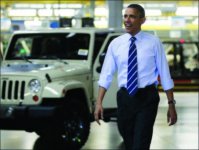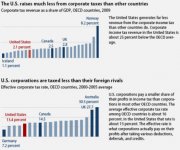There's no bigger challenge to writing about complex topics than making sure words mean what one wants them to. Today's exhibit comes from a story quoting a Jeep executive on the company's plans for getting back into China which, through the power of a clumsly misreading, has morphed into a charge that Jeep "is considering giving up on the United States and shifting production to China." It's not -- but many people suffering from election fever will want to believe it anyway.
The story began with this Bloomberg piece, where Jeep chief Mike Manley talks about the prospects for the Jeep Wranger and Grand Cherokee in China. Chrysler had built the older-generation Jeep Cherokee in China decades ago, but lost the plant en route to bankruptcy, and has been seeking ways back into the world's largest market for new cars since. "We're reviewing the opportunities within existing capacity" Manley told Bloomberg, as well as "should we be localizing the entire Jeep portfolio or some of the Jeep portfolio."
That quote led Paul Bedard of the Washington Examiner to assume Jeep was ready to pack up its Toledo plant and sail west. "It appears that the taxpayer bailed-out Chrysler is looking back and now considering cutting costs by shifting production of all Jeeps to China, which has a strong desire for Jeeps," Bedard wrote today. That story quickly gained traction in political circles, fueled by the continuing political sparring over the bailouts of Chrysler and General Motors that's become a staple of the presidential election.
The problem: Bedard's flat wrong. "Localizing" as Manley said means building versions of Jeep models in China, just as all major automakers tweak their products for Chinese production, safety rules and local tastes. China has yet to become an exporter of vehicles to the United States, and only one automaker imports vehicles from China to the United States today -- the start-up electric car builder Coda, which finishes its cars in California and has sold only a handful to date.
In fact, Chrysler has sunk its roots deeper in Toledo, committing last year to spend $500 million on the factory complex and add 1,100 workers, based on plans to eventually build a variety of models at one of the two plants there. The Toledo Jeep Wrangler plant has been running at full-tilt this year, as has the Detroit plant that builds the Grand Cherokee. Moving either anywhere would cost Chrysler billions of dollars in costs and lost sales -- and both make huge profits for the automaker.
To be fair, this misreading was fueled by President Barack Obama's comment in the last debate that absent his administration's rescue of GM and Chrysler, "we'd be buying cars from China instead of selling cars to China." In truth, Chinese automakers had a chance to buy Jeep and any other part of Chrysler from its private equity owners in February 2008 before its bankruptcy, but passed. Even if a Chinese buyer had carved out Jeep, the finances of shifting output over the Pacific would have been even worse.
People inside the auto industry knew what Manley meant, but stripped of all context, and with no background the phrase could be used to create a political ghost story. Election day can't get here soon enough.



